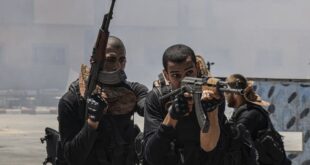 The political leader of the Hamas militant group has said it could create a new Palestinian army following its surprise election victory.
The political leader of the Hamas militant group has said it could create a new Palestinian army following its surprise election victory.
Khaled Meshaal, who lives in exile in Syria, said the force would include its militant wing and would “defend our people against aggression”.
His comments came after foreign powers called for Hamas to renounce violence.
Unrest continues in Gaza and the West Bank, with supporters of the defeated Fatah party staging violent protests.
Some involved clashes with Hamas activists, others were directed at the leadership of Fatah.
‘No immunity’
Mr Meshaal said in the Syrian capital, Damascus, that Hamas had no plans to disarm.
“As long as we are under occupation then resistance is our right.”

He said Hamas was ready to “unify the weapons of Palestinian factions, with Palestinian consensus, and form an army like any independent state… an army that protects our people against aggression”.
But Mr Meshaal also said Hamas would abide by current agreements with Israel “as long as it is in the interest of our people”.
Israel said on Saturday that no Hamas leaders would be immune from targeted killings if the group maintained aggression and continued to refuse to acknowledge Israel’s right to exist.
Defence Minister Shaul Mofaz said: “Whoever stands at the head of a terror organisation and continues to carry out terror attacks against Israel is not immune.”
Senior Fatah figures also warned Hamas not to interfere in the Palestinian security forces – most of whom are linked to Fatah.
Gaza police chief Ala Hosni told Associated Press: “The security institution is a red line. We will not allow anyone to tamper with it.”
The victory of Hamas is a challenge, the people of Palestine have spoken and no-one should suppress their choice
Fatah supporters, security officers and members of the Al-Aqsa Martyrs Brigade protested all over Gaza and the West Bank on Saturday following Hamas’ victory.
Security forces in Gaza demanded Hamas figures responsible for killing policemen should be brought to trial.
Several people were wounded in an exchange of fire between Hamas supporters and members of Fatah in Khan Younis in Gaza.
In Ramallah on the West Bank, Fatah supporters also staged more protest against their own leadership, which they blame for the election defeat.
Some of the activists marched to the compound of Palestinian Authority leader and Fatah chief Mahmoud Abbas, later praying at the grave of former leader Yasser Arafat.
‘Blackmail’
Mr Meshaal said he had been in contact with Mr Abbas and wanted to work in partnership with Fatah, although many senior Fatah officials say they do not want an alliance.
Fatah activists launched violent protests in Gaza and the West Bank
Hamas policy-maker Ghazi Ahmed Hamad said if Fatah did not join a government “we will try to form a government of technocrats”.
Hamas has also rejected international calls for the group to renounce violence or face cuts in aid to Palestinians.
Ismail Haniya, who headed Hamas’ election list, said: “This aid cannot be a sword over the heads of the Palestinian people and will not be material to blackmail our people, to blackmail Hamas and the resistance. It is rejected.”
President George W Bush warned US aid, worth $400m (£225m), could be cut following Hamas’ surprise poll win.
Hamas won at least 74 of the 132 seats in the Palestinian assembly and has the backing of a further four independent
 Eurasia Press & News
Eurasia Press & News
